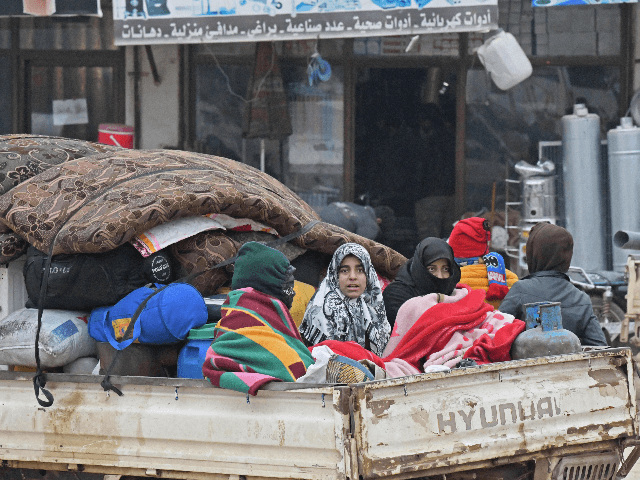The United Nations reported on Tuesday that a huge new wave of displaced civilians is pouring out of Syria’s Idlib province, driven out by intense Syrian and Russian military efforts to crush the last rebel forces and increasing tensions between Turkey and Syria.
According to the U.N., the refugee situation in Idlib is the worst it has been since the beginning of the Syrian civil war.
“In just 10 weeks, since 1 December, some 690,000 people have been displaced from their homes in Idlib and surrounding areas. This is, from our initial analysis, the largest number of people displaced in a single period since the Syrian crisis began almost 9 years ago,” spokesman David Swanson of the U.N. Office for the Coordination of Humanitarian Affairs said on Tuesday.
Swanson pointed to freezing temperatures and snowfall in the region as reasons to fear a massive humanitarian crisis is brewing in Idlib.
“Existing camps and settlements of internally displaced persons are overcrowded, and shelter in existing houses is getting scarce. Many schools and mosques are filled with displaced families, and even finding a place in an unfinished building has become close to impossible,” he warned.
With the new refugee wave added to its grim tally, the Syrian conflict has displaced almost 12 million people, half of them fleeing Syria entirely, making it the worst refugee crisis in the world by a substantial margin.
The government of Turkey frequently complains about the large number of Syrian refugees headed their way, but Turkey is also contributing to the current crisis in Idlib by escalating hostilities with the Syrian military.
On Wednesday, Turkish President Recep Tayyip Erdogan threatened massive reprisals if Syrian forces injure or kill any more Turkish soldiers.
“In case our soldiers at observation points suffer in any way … I hereby declare we will strike back against regime forces everywhere. We will not forgive even the slightest violation,” Erdogan thundered at a meeting of the ruling AKP party in Ankara.
“The Assad regime was dealt a resounding blow, especially in Idlib, but that is not enough. There is more to come,” he vowed, referring to clashes between Syrian troops and Turkish-backed rebel forces. A Syrian military helicopter was shot down by the rebels near one of Turkey’s posts in Idlib on Tuesday. The Turkish military claimed it “neutralized” about a hundred Syrian regime soldiers in retaliation for Syrian shelling that has killed a dozen Turkish soldiers over the past week.
“If there is the smallest injury to our soldiers on the observation posts or other places, I am declaring from here that we will hit the regime forces everywhere from today, regardless of Idlib’s borders or the lines of the Sochi agreement,” Erdogan warned, referring to a ceasefire worked out in 2018 between Erdogan and Russian President Vladimir Putin in the Russian city of Sochi.
“We will do this by any means necessary, by air or ground, without hesitating, without allowing for any stalling,” he said.
Erdogan said his goal is to drive Syrian forces back from the dozen observation posts Turkey maintains in Idlib by the end of this month. The posts were established under the terms of the Sochi agreement with Syria’s patrons in Russia.
Addressing Syrian complaints about continued rebel attacks in the area, Erdogan claimed Turkey has “given the message that we will act without compromise to those from the opposition groups who act in an undisciplined way and give the regime an excuse to attack.”
Erdogan accused the regime in Damascus, along with its Russian and Iranian backers, of “continuously attacking civilians, committing massacres and shedding blood.”
Turkish Foreign Minister Mevlut Cavusoglu backed Erdogan up by asking Russia, and Syria’s other principal patron Iran, to rein in Damascus before it launches further attacks on Idlib.
“Despite declaring a cease-fire, the regime again stepped up its aggression on January 12, especially with the air support provided by those who support the regime,” Cavusoglu said, alluding to Russian air support for Syrian troops and allied militia groups.
Turkey’s position enjoys support from the U.S. government, which denounced the intensity of the Syrian and Russian onslaught against Idlib despite the Sochi cease-fire framework.
“My condolences to the families of the soldiers killed in yesterday’s attack in Idlib. The ongoing assaults by the Assad regime and Russia must stop. I’ve sent Jim Jeffrey to Ankara to coordinate steps to respond to this destabilizing attack. We stand by our NATO ally Turkey,” Secretary of State Mike Pompeo said on Tuesday after five Turkish troops were killed by Syrian shelling on Monday.
“Today, the soldiers of our ally, Turkey, are under threat in Idlib. The threat comes from Russia and Assad’s government,” said Jim Jeffrey, the special envoy to Syria mentioned by Pompeo.
None of these remarks by Erdogan and the U.S. State Department were welcomed in Damascus or Moscow. The Syrian regime snarled that Erdogan’s “empty statements” were “disconnected from reality.”
The Kremlin accused Erdogan of flouting the agreement he made in Sochi to neutralize militants in Idlib and insisted Russia is holding up its end of the bargain.
“The Turkish side undertook to ensure that terrorist groups in Idlib were neutralized. We continue to note with regret that these groups are carrying out strikes from Idlib on Syrian forces and also taking aggressive action against our military facilities,” charged Kremlin spokesman Dmitry Peskov.
“This is unacceptable and runs contrary to the Sochi agreements,” Peskov added.

COMMENTS
Please let us know if you're having issues with commenting.